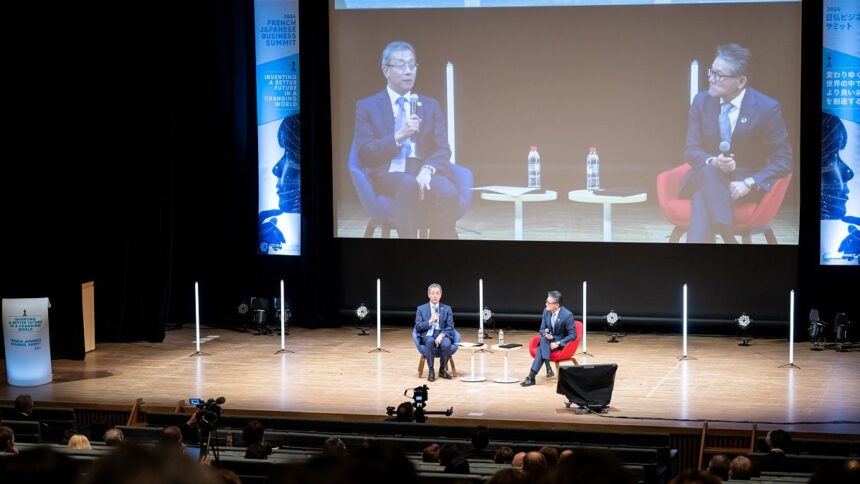CEOs, academics and policymakers have gathered in Tokyo to map out how businesses can forge a resilient and innovative future, as they navigate increasing volatility and instability.
With the dawn of a second Donald Trump administration, Russia’s invasion of Ukraine and renewed tensions in the Middle East, the annual French Japanese Business Summit has brought together industry leaders with a lot on their minds.
An ‘uncertain environment’
From competition and protectionism, to supply chain and recruitment challenges, the event, organised by the French Chamber of Commerce and Industry in Japan (CCI France Japan), heard how businesses can’t afford to stand still in today’s changing world.
“The main objective of this summit is to provide an international platform to question and to build ideas and strategies on how to manage the geopolitical challenges and successfully navigate in an uncertain environment,” Nicolas Bonnardel, General Manager, CCI France Japan, told Euronews Business.
“The Summit is a unique opportunity for fruitful discussions and networking that could give rise to new ideas, new contacts, new business and, above all, that can strengthen the partnerships between French and Japanese companies.”
The threat of Trump tariffs
This year’s summit featured more than 40 speakers, representing big industry names such as EY, Dassault Systems Japan, the Veolia Group, FORVIA Asia and Mitsubishi Electric.
“The supply chain issue, caused by the geopolitical issues, it is one of the biggest challenges for us,” said Masahiro Oya, Executive Officer and Vice President, in the Global Strategic Planning and Marketing Group at Mitsubishi Electric. “Also, the trade issue. So, after the Trump administration starts, the tariff issue. But at this moment we don’t know what kind of impact we will have.”
Oya continued: “We have to study, and we have to make some scenarios. We have to be prepared for whatever happens, so that we can adjust ourselves.”
Decoupling: a business opportunity?
As well as well-known industry leaders, start-ups such as Japanese enterprise Power X Inc., were also represented at this year’s Tokyo summit.
Director, President and CEO Masahiro Ito, who launched his first company when he was just 17, is on a mission to help realise the green energy transition in Japan, through the development of batteries, for the storage of renewables.
“Our supply chain is global, so we do have to buy things from China, from other parts of the world. Our talent pool is also global and I fear there’s a lot of decoupling that’s happening right now,” Ito highlighted to Euronews Business.
But he added that decoupling also brought benefits for his venture, noting that Power X’s customers “are energy companies in Japan, who want to have batteries controlled domestically. They don’t want to buy a product that has a black box in it. They want to buy a local, Japan-controlled battery.”
Growing sustainable economies
The green transition, decarbonisation and building sustainable economies dominated discussions at the French Japanese summit.
This, as businesses everywhere come under increasing pressure and scrutiny over their planet-friendly credentials, both from regulators and consumers.
At the recent COP29 climate conference in Baku, the event president Mukhtar Babayev told delegates that the world was “on the road to ruin” and climate impacts “are not future problems.”
“I personally believe we need to be running and that requires a lot of fundamental change,” said Ito, from Power X Inc., as he looked to the future of the energy sector.
“The only way to do this is I think is economics. Electricity has to be cleaner and also cheaper. And we’re finally seeing that with solar, we’re finally seeing that with batteries and technology, the innovation is catching up. So, in a few more years, the cleaner choice will hopefully be the cheapest choice and then we’ll see the change.”
Future of food
Climate change also poses significant threats to food security and global health. Japanese multinational food company Ajinomoto, which has a Europe and Africa headquarters in France, has set itself a double goal: of helping to extend the healthy life expectancy of one billion people worldwide, and reducing its environmental impacts by 50 percent.
“With these points, we have many opportunities to develop our business,” Taro Fujie,
Director, Representative Executive Officer, President and CEO of Ajinomoto Co., Inc., told Euronews Business at the summit.
On promoting health and wellbeing, the company says reducing salt consumption amongst consumers is a big focus; and protecting food resources, conserving biodiversity and reducing food and plastic waste are key areas of its sustainability drive.
Fujie highlighted an animal feed product which, by delivering an amino acid to cows, is said to play a “pivotal role” in reducing a range of greenhouse gas emissions in the dairy industry, including methane. It’s now part of a global strategic partnership with Danone, who’s introducing it to farmers in Spain, Brazil, the US, Egypt and Morocco.
Consumers changing ‘dramatically’
Fujie said that addressing today’s health and sustainability challenges was driven by the company’s founding principles, and that no company can stand still in the face of growing consumer expectations.
“The total consumer concept is changing dramatically. Especially in the young generation, they think sustainability is very, very important. So, for future development, sustainability is mandatory,” he stressed.










